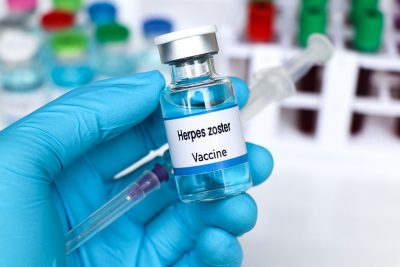
Recombinant Herpes Zoster Vaccine in a Medicare Population
November 1, 2025
By Stan Deresinski, MD, FACP, FIDSA
Synopsis: Receipt of adjuvanted recombinant herpes zoster vaccine was effective in individuals older than 64 years of age and maintained its efficacy in immunocompromised individuals. Added benefit accrued from receipt of the second vaccine dose, even if its administration was delayed.
Source: Vielot NA, Jonsson Funk M, Stürmer T, et al. Effectiveness of recombinant herpes zoster vaccine in the U.S. Medicare population, 2018 to 2019, by immunocompetence and prior receipt of live zoster vaccine. Ann Intern Med. 2025;Oct 14. doi: 10.7326/ANNALS-24-02409. [Online ahead of print].
Vielot and colleagues examined the one-year efficacy of the adjuvanted recombinant zoster vaccine (RZV) in a random 20% sample of Medicare enrollees who were ≥ 65 years of age between 2007 and 2019. The primary outcome, any herpes zoster (HZ)-related event (HZ, ophthalmic HZ, postherpetic neuralgia), was evaluated in two target trial emulations analyses, with the second analyzing the efficacy of one vs. two doses of the vaccine.
In the first analysis, there were 36,762,933 observations in 3,456,555 unique individuals across 12 emulated sequential (based on assigned start date) trials. The estimated one-year vaccine efficacy (VE) of receipt of at least one vaccine dose was 56.1% for any HZ outcome. This included 55.2% VE against ophthalmic zoster and 72.0% against postherpetic neuralgia. It was further estimated that, overall, vaccination prevented (per 100,000 persons) 698 HZ cases, 58 ophthalmic zoster cases, and 78 cases of postherpetic neuralgia. Overall, there was no significant difference in VE in immunocompetent (56.5%; 95% confidence interval [CI], 53.2% to 59.5%) compared to immunocompromised (54.2%; 95% CI, 44.7% to 62.1%) patients. Black subjects had reduced VE.
A number of subjects had received live zoster vaccine (ZVL) before its discontinuation in 2020, but prior receipt of ZVL did not affect the VE of subsequent receipt of RZV. Thus, RZV effectiveness was 51.8% (95% CI, 44.7% to 57.9%) among individuals who had received ZVL vaccination within the previous 10 years and 57.7% (95% CI, 54.2% to 60.9%) in those who had not.
The benefit of receipt of the recommended second dose of RZV was examined in a separate emulated trial analysis. Receipt of a second RZV dose conferred an additional 67.9% effectiveness against any HZ outcome. This benefit occurred whether the second dose was administered within the recommended six-month period after the first dose.
Commentary
ZVL (Zostavax) was approved for use by the Food and Drug Administration (FDA) after demonstration of its efficacy in randomized controlled clinical trials. However, immunocompromised individuals were excluded from these trials because of the potential danger of a live attenuated virus vaccine in such subjects. In addition, follow-up studies found that the duration of immunity after its use was limited, perhaps to no more than five years. RZV (Shingrix), a two-dose adjuvanted recombinant vaccine was approved in 2017, leading to the withdrawal of ZVL from use. Despite its presumed safety, immunocompromised individuals had been excluded from the relevant clinical trials, leaving a level of uncertainty.
The work of Vielot and colleagues reviewed here clearly demonstrates the efficacy of RZV in prevention of HZ events and validates that this benefit extends to individuals with immunocompromise — although the level of immunocompromise was variable and often not profound. Also of note is that although RZV is approved for use in individuals as young as 50 years of age, this study, based on a Medicare population, did not include those 50-64 years of age.
This study did demonstrate the benefit of RZV in individuals who had received ZVL prior to its withdrawal. Importantly, it also demonstrated the benefit of the second dose of RZV, even if its administration is delayed beyond the recommended six-month window after the first dose.
Not discussed here but also of importance is evidence indicating that RZV receipt is associated with a reduced risk of the occurrence of dementia.1
Stan Deresinski, MD, FACP, FIDSA, is Clinical Professor of Medicine, Stanford University.
Reference
1. Taquet M, Dercon Q, Todd JA, Harrison PJ. The recombinant shingles vaccine is associated with lower risk of dementia. Nat Med. 2024;Jul 25. doi: 10.1038/s41591-024-03201-5. [Online ahead of print].